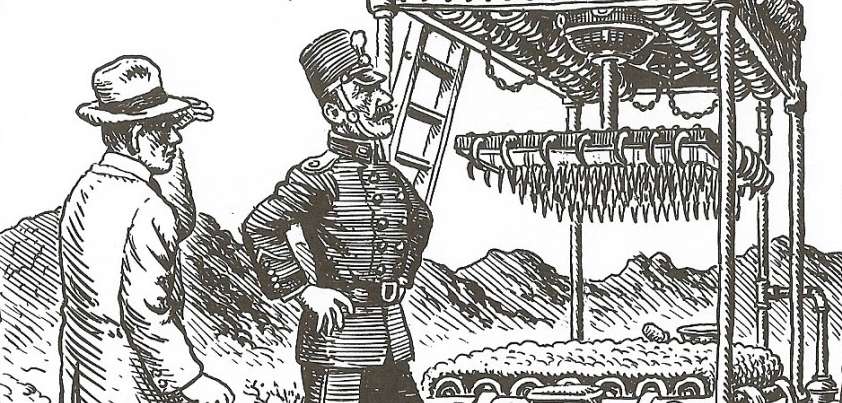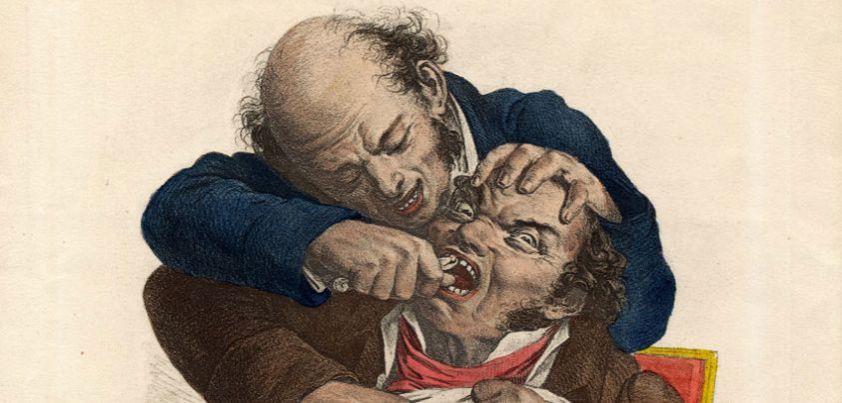 This Franz Kafka story is a study on what can happen when you put a psychopath in charge of a process (or country) in which they have unfettered power and can make decisions over life and death with impunity. The story deals with some heavy themes: justice, due process, capital punishment, torture, sadistic voyeurism, and the difficulty of institutional change (even if for the good!). Central to all this is the “machine”, which seems to know that its time has come and chooses to self-destruct along with the only person left who cares about it. More…
This Franz Kafka story is a study on what can happen when you put a psychopath in charge of a process (or country) in which they have unfettered power and can make decisions over life and death with impunity. The story deals with some heavy themes: justice, due process, capital punishment, torture, sadistic voyeurism, and the difficulty of institutional change (even if for the good!). Central to all this is the “machine”, which seems to know that its time has come and chooses to self-destruct along with the only person left who cares about it. More…
Tobermory
 This story by Saki is a satire of early twentieth century British high society. A group of socialites attend a weekend house-party. Among the guests is a visiting scientist who was invited in the hope that his cleverness would contribute to the general entertainment. All are amazed when he teaches Tobermory, the family housecat, to speak perfect English. However, their surprise soon turns to anger at some of the things Tobermory has to say. This seals Tobermory’s fate… he knows too much and must be silenced! Themes include wonder, superficiality and hypocrisy, embarrassment, anger, retribution More…
This story by Saki is a satire of early twentieth century British high society. A group of socialites attend a weekend house-party. Among the guests is a visiting scientist who was invited in the hope that his cleverness would contribute to the general entertainment. All are amazed when he teaches Tobermory, the family housecat, to speak perfect English. However, their surprise soon turns to anger at some of the things Tobermory has to say. This seals Tobermory’s fate… he knows too much and must be silenced! Themes include wonder, superficiality and hypocrisy, embarrassment, anger, retribution More…
The Dog of Tithwal
 This story from Saadat Hasan Manto takes place during the first Indo-Pakistan (Kashmir) War, which commenced just two months after the 1947 formation of the two countries. The war was a form of “Mexican standoff”. This is reflected in the plot, where soldiers break their boredom with occasional shots towards the enemy camp that have no chance of hitting anyone. The treatment and killing of Jhun Jhun for “refusing” to take sides is symbolic of the suffering of civilians caught up in the conflict. Themes: natural peace and harmony vs. mankind’s propensity for violence, futility, innocence, distrust, cruelty, human suffering. More…
This story from Saadat Hasan Manto takes place during the first Indo-Pakistan (Kashmir) War, which commenced just two months after the 1947 formation of the two countries. The war was a form of “Mexican standoff”. This is reflected in the plot, where soldiers break their boredom with occasional shots towards the enemy camp that have no chance of hitting anyone. The treatment and killing of Jhun Jhun for “refusing” to take sides is symbolic of the suffering of civilians caught up in the conflict. Themes: natural peace and harmony vs. mankind’s propensity for violence, futility, innocence, distrust, cruelty, human suffering. More…
One of These Days
 In this story by Gabriel Garcia Marquez, a corrupt Mayor approaches a dentist to treat an abscessed tooth. The dentist does not want to help, but knows he will be killed if he refuses. The dentist has a revolver in a drawer next to his chair. Once the Mayor is in the chair, the dentist has him at his mercy. In a quiet but serious voice, he says to the Mayor: “Now you’ll pay for our twenty dead men.” The dentist has decided what has to be done… does he pull the trigger, or pull the tooth? More…
In this story by Gabriel Garcia Marquez, a corrupt Mayor approaches a dentist to treat an abscessed tooth. The dentist does not want to help, but knows he will be killed if he refuses. The dentist has a revolver in a drawer next to his chair. Once the Mayor is in the chair, the dentist has him at his mercy. In a quiet but serious voice, he says to the Mayor: “Now you’ll pay for our twenty dead men.” The dentist has decided what has to be done… does he pull the trigger, or pull the tooth? More…
Wedding Night
 In this touching story by Sait Faik Abasıyanık, a Turkish father belatedly registers the birth of his sixteen-year-old son so he can get married. Fortunately, the boy looks much older than he is. The minimum marriage age is twenty, and he must be registered as being twenty-four because his bride, who he has never seen, is twenty-six! The poor boy has been plied with alcohol, and is trembling like he did at his circumcision four years earlier. After a shaky start, they emerge from the bridal chamber happy. Themes include tradition, arranged marriages, naivety, anxiety, confusion. More…
In this touching story by Sait Faik Abasıyanık, a Turkish father belatedly registers the birth of his sixteen-year-old son so he can get married. Fortunately, the boy looks much older than he is. The minimum marriage age is twenty, and he must be registered as being twenty-four because his bride, who he has never seen, is twenty-six! The poor boy has been plied with alcohol, and is trembling like he did at his circumcision four years earlier. After a shaky start, they emerge from the bridal chamber happy. Themes include tradition, arranged marriages, naivety, anxiety, confusion. More…